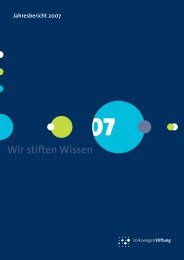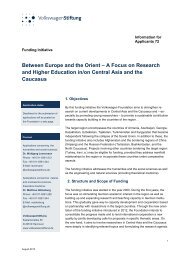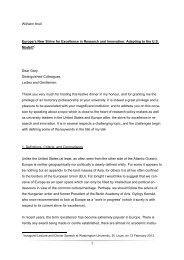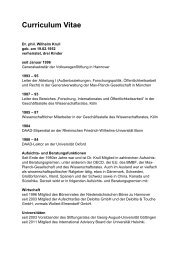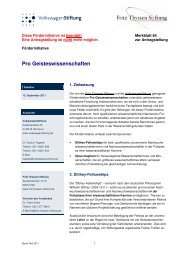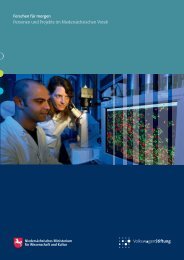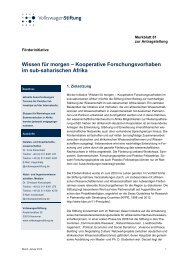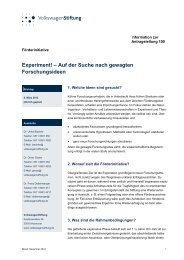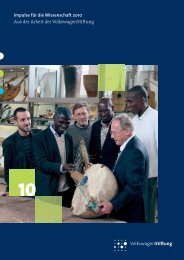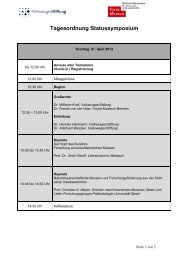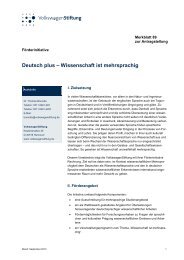Funding
Funding
Funding
Create successful ePaper yourself
Turn your PDF publications into a flip-book with our unique Google optimized e-Paper software.
42<br />
They have given their project the name LiLaC<br />
– Literacy between Languages and Cultures:<br />
The research team in Dortmund comprises<br />
linguists Annette Herkenrath, Professor Dr.<br />
Ludger Hoffmann, Professor Dr. Uta Quast -<br />
hoff (behind, left) and Sören Ohlhus, Nicole<br />
Hinrichs, Nils Kremeskötter (foreground from<br />
the left).<br />
Professor Dr. Ludger Hoffmann and Nils<br />
Kremeskötter discussing the acoustic analysis<br />
of vocal intonation.<br />
will help to change: She is joined in the project by her colleagues Professor<br />
Dr. Ludger Hoffmann and Professor Dr. Dr. Michael Kastner from Dortmund.<br />
Their main research objective is to develop concepts designed to support<br />
migrants and disadvantaged “monolinguists” in their dealings with official<br />
agencies – for example by means of developing simplified or translated forms,<br />
qualified help in filling out forms, or customized courses of further education.<br />
Quasthoff and her colleagues started their project by carrying out the necessary<br />
empirical analysis. They intend to throw light on the economic, social,<br />
and cultural difficulties experienced by first and second generation Turkish<br />
migrants as well as monolinguists from comparable backgrounds in their<br />
dealings with officialdom: Where do non-native speakers perceive room for<br />
improvements and what are the most frequently occurring problems. To help<br />
them in their investigation, the team has distributed questionnaires in several<br />
underprivileged neighborhoods in the industrial Ruhr district. “By comparing<br />
the two groups, we hope to find out how much of the problem can be<br />
traced to multilingualism and migration biographies, and what is more likely<br />
attributable to low levels of education or other forms of social disadvantage”,<br />
explains Uta Quasthoff.<br />
Some 400 respondents answered the questionnaire. From this initial group,<br />
the team will eventually select 48 participants with whom they will conduct<br />
comprehensive autobiographical interviews, ideally representatives across<br />
three generations of a family. “One of our objectives is to determine the linguistic<br />
skills common to each different age group; another is to find out how<br />
specific factors influence their contact with the public authorities – e.g. educational<br />
background, gender, or life courses.” They will also examine the<br />
interviewees’ self-perception with regard to whether they see themselves<br />
in the mainstream of society, or more on the periphery.<br />
By employing a cross-generational form of investigation the Dortmund<br />
researchers hope to reveal how the perspectives and attitudes within a<br />
migrant family change over time. The interviews are also expected to result<br />
in useable proposals to improve the situation. This is the common approach<br />
shared by all three “Study Groups on Migration and Integration” working<br />
on questions of structure and change of language within the Foundation’s<br />
funding scheme. First, they investigate where language difficulties hinder<br />
integration. Then the research results will help to identify ways to introduce<br />
practical changes designed to facilitate the integration of migrants.<br />
This also applies to the research project run by Professor Dr. Michael Bommes<br />
from the Institute for Migration Research and Intercultural Studies (IMIS) at the<br />
University of Osnabrück. He and his colleagues are researching how children<br />
are taught how to write in Germany and in Turkey – and how the different<br />
organization of schooling in the two countries impacts on this process. The<br />
title of the project is “Learning to read and write at school in circumstances



